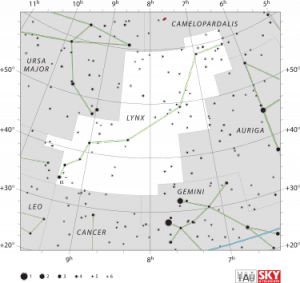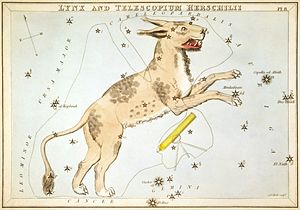Lynx: Difference between revisions
(Created page with "Lynx is a constellation in the northern sky, introduced in the 17th century by Johannes Hevelius. It is named after the lynx, a genus of cat. It is mostly a very faint constel...") |
|||
| (4 intermediate revisions by the same user not shown) | |||
| Line 1: | Line 1: | ||
[[File:375px-Lynx IAU.svg.png|thumb|Lynx]] | |||
Lynx is a constellation in the northern sky, introduced in the 17th century by Johannes Hevelius. It is named after the lynx, a genus of cat. It is mostly a very faint constellation; its brightest stars form a zigzag line.The only named star in this constellation is Alsciaukat (from the Arabic for thorn), also known as 31 Lyncis, or κ Lyncis. | Lynx is a constellation in the northern sky, introduced in the 17th century by Johannes Hevelius. It is named after the lynx, a genus of cat. It is mostly a very faint constellation; its brightest stars form a zigzag line.The only named star in this constellation is Alsciaukat (from the Arabic for thorn), also known as 31 Lyncis, or κ Lyncis. | ||
Lynx's most notable deep sky object is the Intergalactic Tramp NGC 2419, also called the "Intergalactic Wanderer", a globular cluster that is one of the most distant known of its kind at a distance of 300,000 light-years from Earth. It is likely that NGC 2419 is in a highly elliptical orbit around the Milky Way. <ref>[http://en.wikipedia.org/wiki/Lynx_%28constellation%29 Lynx]]</ref> | Lynx's most notable deep sky object is the Intergalactic Tramp NGC 2419, also called the "Intergalactic Wanderer", a globular cluster that is one of the most distant known of its kind at a distance of 300,000 light-years from Earth. It is likely that NGC 2419 is in a highly elliptical orbit around the Milky Way. <ref>[http://en.wikipedia.org/wiki/Lynx_%28constellation%29 Lynx]]</ref> | ||
| Line 4: | Line 5: | ||
The Lynx has often played an important role in mythology, because it is such an elusive, ghost-like animal that sees without being seen. Because of it's qualities of silence and watching, the Lynx has also been associated with scientists, and the search for knowledge.<ref>[http://www.constellationsofwords.com/Constellations/Lynx.htm Constellations of Words]</ref> | The Lynx has often played an important role in mythology, because it is such an elusive, ghost-like animal that sees without being seen. Because of it's qualities of silence and watching, the Lynx has also been associated with scientists, and the search for knowledge.<ref>[http://www.constellationsofwords.com/Constellations/Lynx.htm Constellations of Words]</ref> | ||
[[File:Sidney Hall - Urania's Mirror - Lynx and Telescopium Herschilii.jpg|thumb|File:Sidney Hall - Urania's Mirror - Lynx and Telescopium Herschilii.jpg]] | |||
==HGS Session References== | ==HGS Session References== | ||
HGS Sessions - Clearing [[Hyperspace Phantom Matrix]] - 3/12/2015 <ref>[http://www.energeticsynthesis.com/index.php/forum/52-hgs-discussions-and-q-a-a/60650-hgs-shared-sessions-and-discussion?start=126h HGS Session]</ref> | HGS Sessions - Clearing [[Hyperspace Phantom Matrix]] - 3/12/2015 <ref>[http://www.energeticsynthesis.com/index.php/forum/52-hgs-discussions-and-q-a-a/60650-hgs-shared-sessions-and-discussion?start=126h HGS Session]</ref>HGS Sessions - Clearing [[Planetary Ley Lines, 6D, 7D]] - 3/19/2015 <ref>[http://www.energeticsynthesis.com/index.php/forum/planetary-emancipation-gridwork-peg/60919-documenting-hgs-sessions-for-peg-gridwork?start=42#101301 HGS Session]</ref>HGS Sessions - Clearing [[Chamaeleon, Lacerta, Piscis Austrinus]] - 3/20/2015 <ref>[http://www.energeticsynthesis.com/index.php/forum/planetary-emancipation-gridwork-peg/60919-documenting-hgs-sessions-for-peg-gridwork?start=42 HGS Session]</ref> | ||
==References== | ==References== | ||
Latest revision as of 00:01, 21 March 2015
Lynx is a constellation in the northern sky, introduced in the 17th century by Johannes Hevelius. It is named after the lynx, a genus of cat. It is mostly a very faint constellation; its brightest stars form a zigzag line.The only named star in this constellation is Alsciaukat (from the Arabic for thorn), also known as 31 Lyncis, or κ Lyncis. Lynx's most notable deep sky object is the Intergalactic Tramp NGC 2419, also called the "Intergalactic Wanderer", a globular cluster that is one of the most distant known of its kind at a distance of 300,000 light-years from Earth. It is likely that NGC 2419 is in a highly elliptical orbit around the Milky Way. [1]
The Lynx has often played an important role in mythology, because it is such an elusive, ghost-like animal that sees without being seen. Because of it's qualities of silence and watching, the Lynx has also been associated with scientists, and the search for knowledge.[2]
HGS Session References
HGS Sessions - Clearing Hyperspace Phantom Matrix - 3/12/2015 [3]HGS Sessions - Clearing Planetary Ley Lines, 6D, 7D - 3/19/2015 [4]HGS Sessions - Clearing Chamaeleon, Lacerta, Piscis Austrinus - 3/20/2015 [5]
References
Found in HGS Manual on Page 108
Found in HGS Manual on Page 115



